CS Seniors Showcase Innovative Solutions to problems at the Fall’19 UTDesign CS Expo
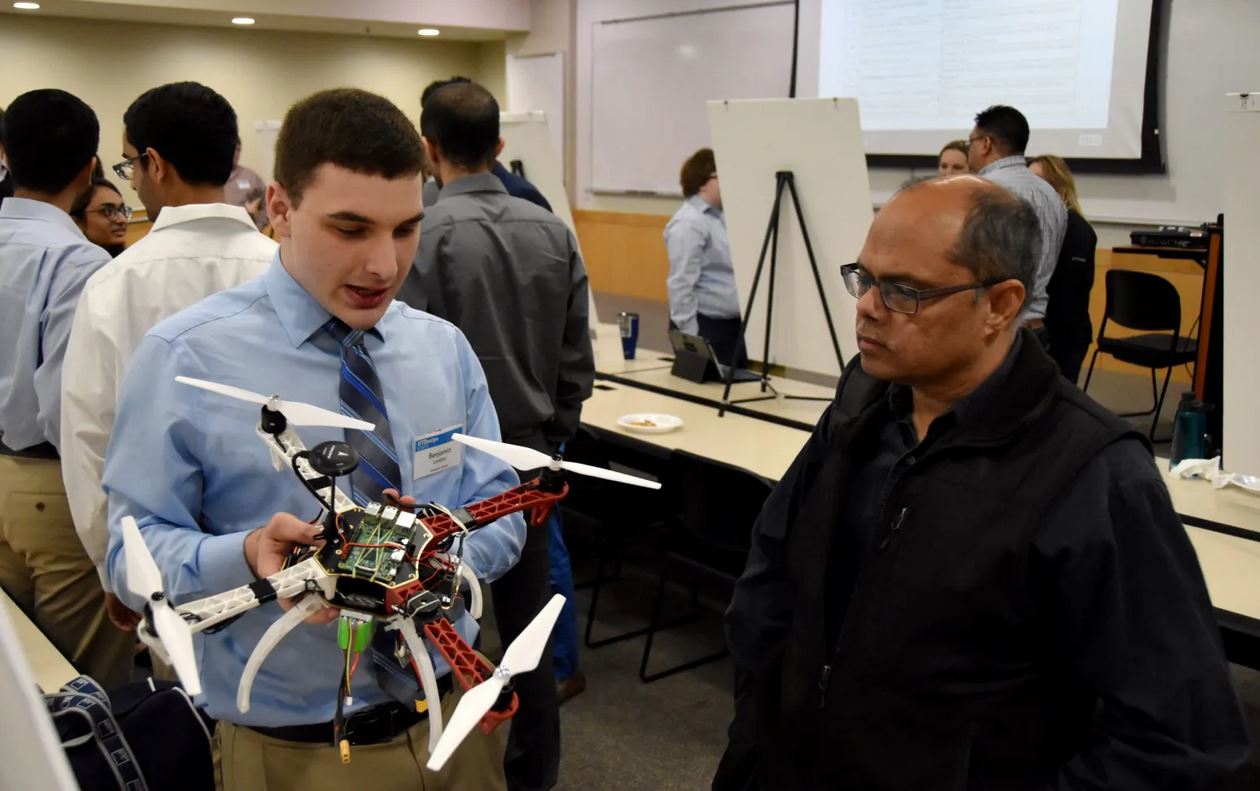
UT Dallas Computer Science and Software Engineering seniors came together last December to present their capstone projects at the Fall 2019 UTDesign Computer Science Expo. Forty teams ranging from three to five members each presented their final projects to a room full of their peers, UT Dallas faculty members, and industry professionals. These final projects are intended to afford students the opportunity to apply concepts they have learned in past courses, to engage in a full-scale design process, as well as to practice their project-management and problem-solving skills. This combination of practical and theoretical education ensures students are provided with the experiences that will help them create innovative solutions to problems through hands-on exploration, which will ensure that students are prepared for careers in industry, academia, and government. As an ancillary benefit, through working with and presenting to industry representatives, students have the opportunity for internships as well as potentially being recruited for permanent employment by company sponsors.
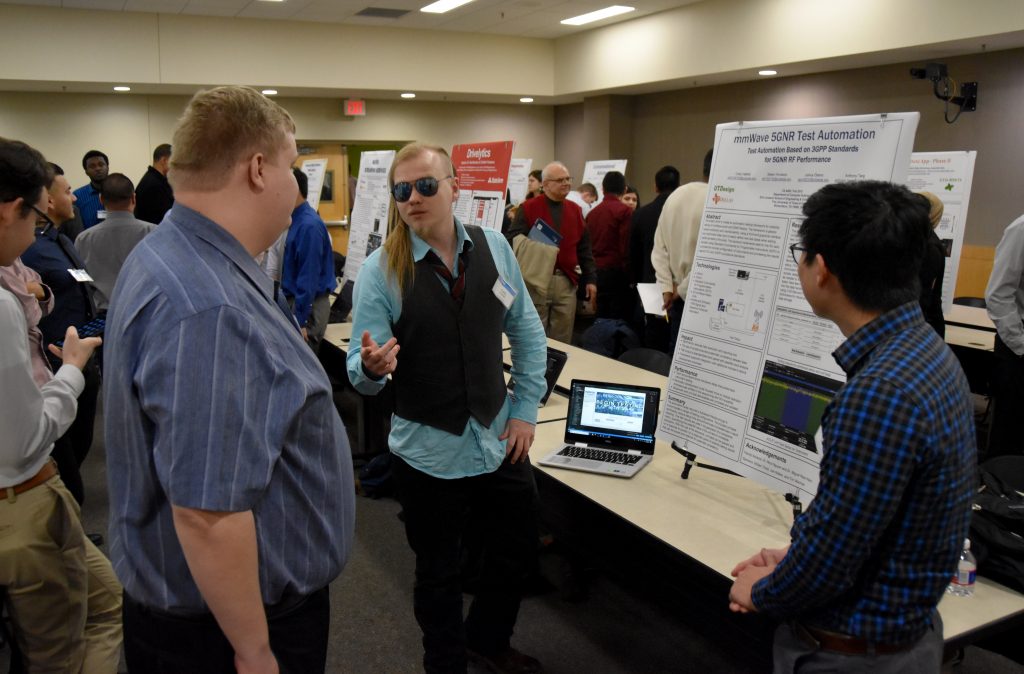
The final results of the projects created by CS/SE seniors illustrate a wide range of applications. They ranged from a prosecutor digital evidence review queue that enables law enforcement officers to send evidence and case files digitally to a prosecutor’s review queue, to a biometric data app that examines the environmental impact on human physical and cognitive performance, to a project for Raytheon that uses drones to detect, track, and avoid incoming airborne hazards autonomously. Many of the projects utilized multiple fields of computer science and software engineering, such as Artificial Intelligence, Machine Learning, Natural Language Processing, Deep Learning, Blockchain, and Data Analytics.
The capstone projects provide the culmination of the UT Dallas CS/SE learning experience. During the course of the semester, students are tasked to apply what they have learned as they research, design, and deliver solutions to corporate and community partners. In most cases, the projects are also interdisciplinary, requiring students to apply skills or investigate issues across various subject matters. Although the projects do showcase students’ educational achievements, they also demonstrate that these students are able to learn in a hands-on environment and know how to work together to address real-world issues in human-centered design and engineering.
While offering students the opportunity to work on practical, real-world engineering problems, these projects also afford companies a fresh look at design or production issues. To achieve this objective, students are encouraged to engage in the design process fully and use their project management skills, including planning, budgeting, communication, scheduling, and presentations. This is in conjunction with applying critical thinking and problem-solving skills while working on projects applicable to a variety of companies, consumers, and/or UT Dallas faculty members’ research. By having students develop a project from its initial concept to its completion, students are exposed to very realistic work experiences that help them prepare for their future careers.
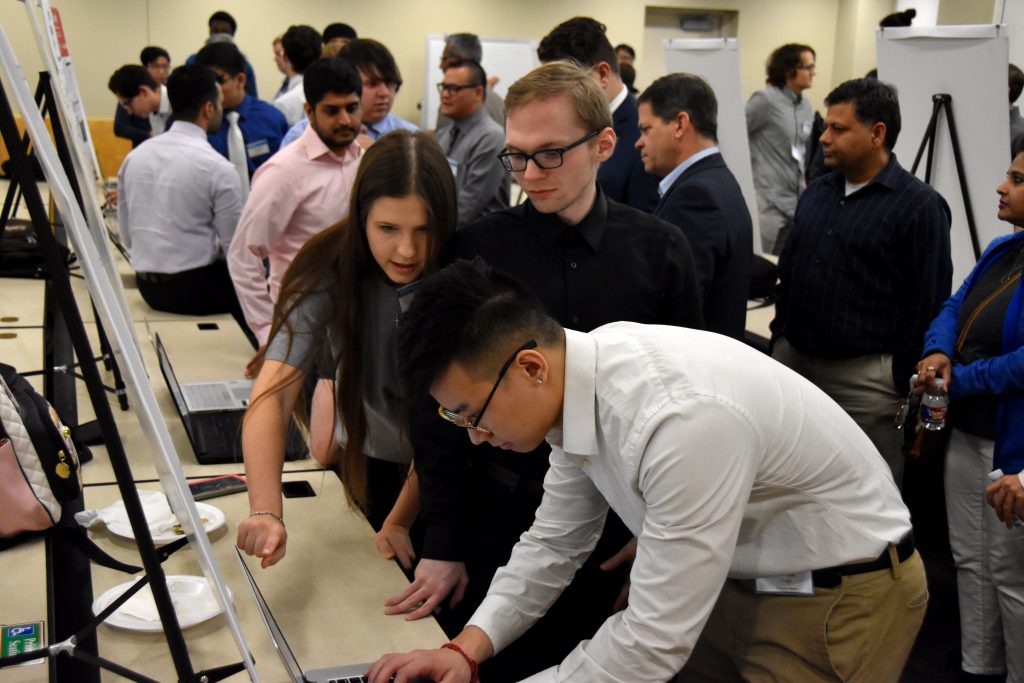
The involvement of company mentors is crucial to the success of the projects and the learning process for the students. Corporate experts mentor the team to assist them in meeting benchmarks during the project and help the students with learning new technology used in the company. In doing so, the students benefit from real-world corporate experiences as well as gain an appreciation for results-oriented teamwork.
Among the corporate sponsors in the fall’19 CS UTDesign expo were Aprima, Atos, Axxess, Raytheon, Texas Instruments, Nokia, State Farm, Citi, Capital One, Signapay, Concentrix, Tyler Technologies, Tokio Marine HCC, Bridging Biosciences, NTT DATA, PCCI, Sahai Inc., GOPI Corp, Health@Hand, Strker, UTD-MINTS, Luminator Technology Group, Memory Medical Systems, Microfocus, and SPX Transformer Solutions. Many of these companies have used the code that students have developed and have put it into production within their respective companies. The capstone project course was taught by Dr. Miguel Razo, who is also the CS UTDesign program director. Dr. Razo was assisted by the UT Design Staff led by Assistant Dean Mr. Rod Wetterskog.
On the day of the expo, there were three presentation rooms, and each team was allowed to use only one slide to present their work. Brevity was critical in communicating the goal of the project, design of the project, project testing, validation plan, results achieved, project management approach, and acknowledgment of sponsors – all presented within their allotted five minutes. Projects were judged based on the quality of technical content within the presentation – problem description, design approach, and implementation – as well as oral and visual presentation skills. This included effective use of 5 minutes to present, understand/explain the social impact of the project, ability to explain the process followed for the project with support from related documentation, and the quality of technical content in the poster.
The following were the three winning teams:
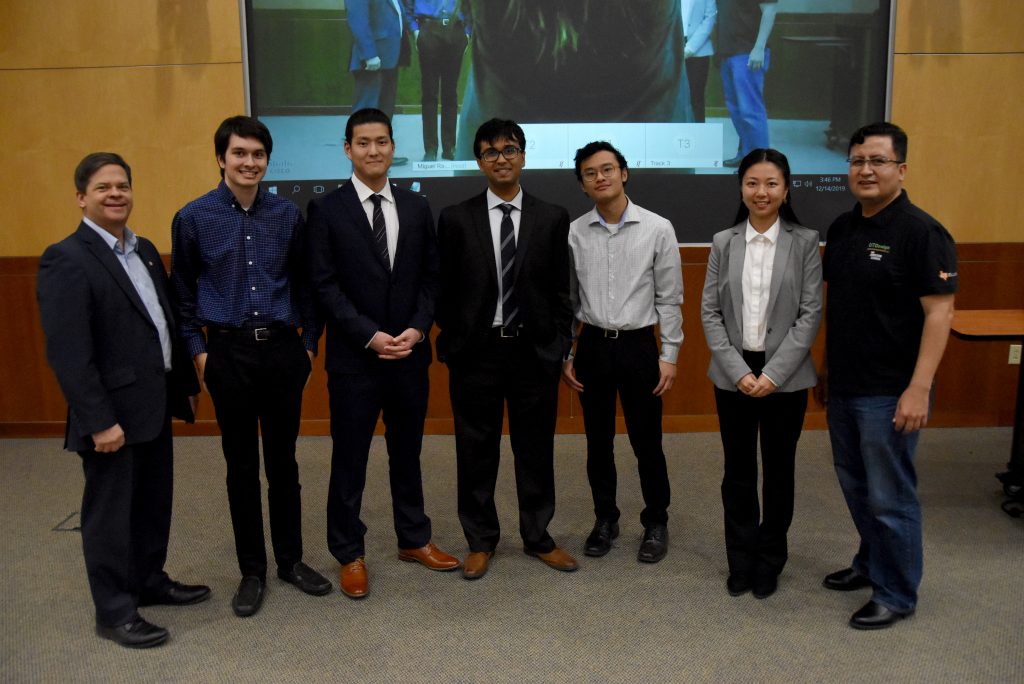
Track One Winning Team – Tokio Marine HCC – I.T. Infrastructure Dashboard with ML Powered Analytics – Project team members include Enoch Ng, Jacob Villarreal, Masahiro Yoshida, Vivi Song, and Zain Merchant.
The goal of this project was to develop a real-time visualization and prediction application for various resource utilization metrics in Tokio Marine HCC’s on-premise server and storage environments.
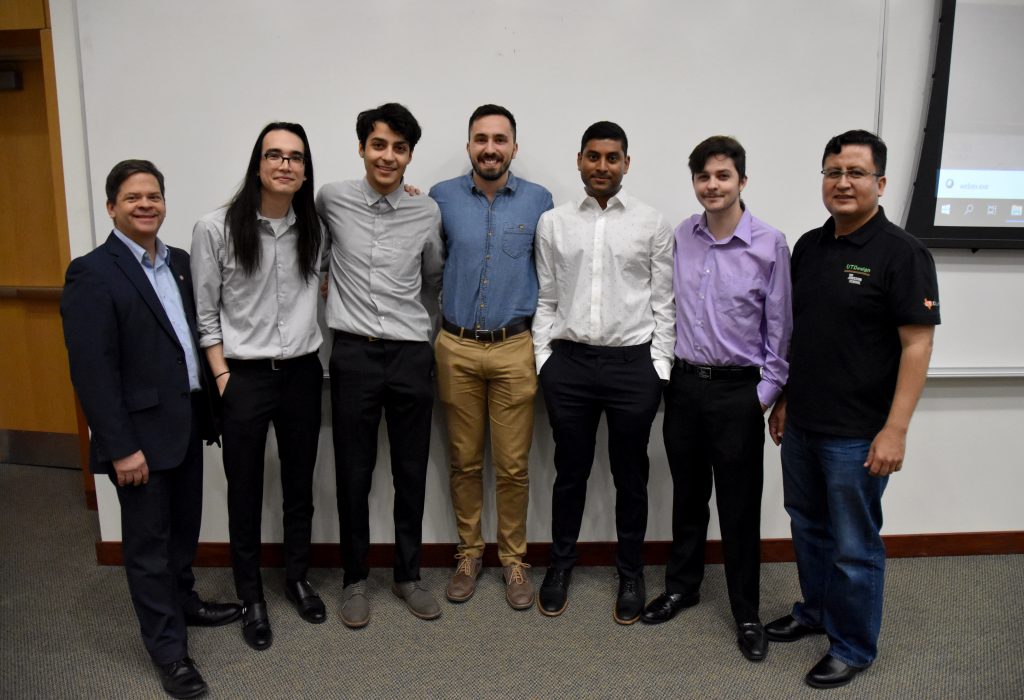
Track Two Winning Team – UTD-MINTS – Biometric Data App – Project team members include Amna Ali, Jacqueline Solis, Ritika Shrivastava, and Shlock Kothari.
The goal of this project was to build a Biometric Data App that examines the environmental impact on human physical and cognitive performances from an interactive dashboard.
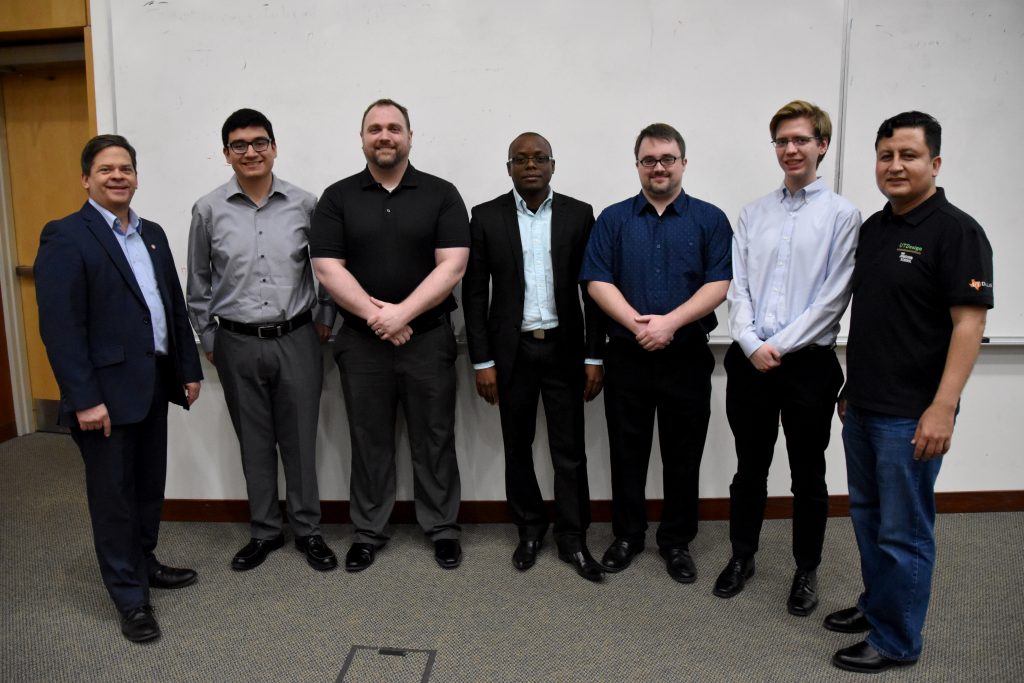
Track Three Winning Team – Tyler Technologies – T1 – Prosecutor Digital Evidence Review Queue – Team members include Brian Malouf, Gabriel Betancourt, Michael Teeple, Philip Nilsson, and Patrick Meyomesse.
This project’s goal was to build a web application that enables law enforcement officers to send evidence and case files digitally to a prosecutor’s review queue. This paperless system reduces processing times and allows prosecution in a timelier manner. This web application makes use of cloud computing, namely, using Amazon Web Services.
View all the photos from the Fall’19 UTDesign CS Expo.
ABOUT THE UT DALLAS COMPUTER SCIENCE DEPARTMENT
The UT Dallas Computer Science program is one of the largest Computer Science departments in the United States with over 3,315 bachelors-degree students, more than 1,110 master’s students, 165 Ph.D. students, 52 tenure-track faculty members, and 44 full-time senior lecturers, as of Fall 2019. With The University of Texas at Dallas’ unique history of starting as a graduate institution first, the CS Department is built on a legacy of valuing innovative research and providing advanced training for software engineers and computer scientists.




